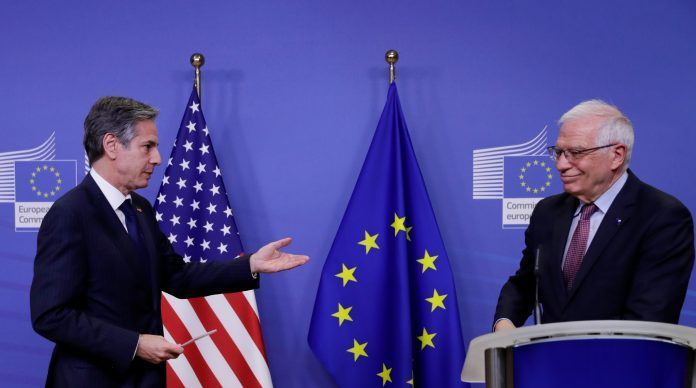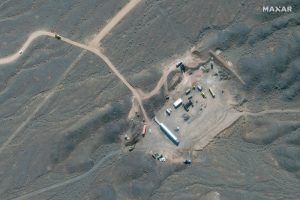
By Ahmad Rafat
European countries are increasingly worried about the Islamic Republic of Iran’s advancing nuclear program and a potential alteration of its nuclear doctrine. U.S. President Joe Biden’s administration has further complicated the situation by signaling that it would not increase pressure on Iran before the upcoming presidential elections in November 2024.
The UK, France and other countries in Europe will reportedly submit a resolution condemning the Islamic Republic’s escalating nuclear activities at the upcoming June meeting of the International Atomic Energy Agency (IAEA) Board of Governors. However, the U.S. has warned that it will abstain from this resolution.
Speaking to Kayhan Life, a representative of a European country that is a member of the IAEA Board of Governors said: “The United States is currently engaged in efforts to dissuade European countries from introducing draft resolutions condemning Iran’s nuclear program at the board of governors meeting.”
“The U.S. is also trying to persuade the non-EU members of the board of governors to abstain, hoping to prevent the resolution from getting enough votes for approval,” they added.
In early May, the Biden administration engaged in indirect and confidential discussions with representatives of the Islamic Republic in Muscat, the capital of Oman, facilitated by the Sultanate of Oman. These talks aimed to manage tensions with Iran until after the November elections. Democrats in the U.S. believe that escalating conflicts with Tehran could impact the election outcome in favor of Biden’s rival, Donald Trump.
European Powers Seek Action Against Iran at IAEA Meeting Despite US Concerns
Iran is cognizant of the concerns coming out of the White House and is strategically leveraging this to capitalize on what it perceives as a vulnerability in President Joe Biden’s administration. This approach was underscored by remarks made on May 26 by Abbas Araghchi, Iran’s former chief nuclear negotiator and the current secretary of the Strategic Council on Foreign Relations.
Mr. Araghchi said that if Israel persists with its nuclear threats — alluding to the attack on an airbase in Isfahan near Iran’s nuclear facilities on April 19, in response to a missile launch towards Israel on April 13 — such actions could compel the Islamic Republic to reassess its official stance on nuclear programs.
Kamal Kharazi, the former foreign minister, and current chair of the Strategic Council on Foreign Relations, recently issued the same warning regarding Iran’s nuclear program during an interview with the Qatar-based Al Jazeera TV.
The reconsideration mentioned by these two Iranian officials pertains to a review of a fatwa (religious decree) issued by Iran’s Supreme Leader Ali Khamenei on December 12, 2010, amidst international sanctions, explicitly prohibiting the development and use of weapons of mass destruction, including nuclear, chemical, and biological arms.
By invoking this fatwa, Iran has tried to show to the international community that its nuclear program is for peaceful civilian use. However, it is vital to remember that the 2015 nuclear agreement, known as the Joint Comprehensive Plan of Action (JCPOA), will end in October of next year.
ANALYSIS: The UN Nuclear Watchdog’s Long List of Difficulties in Iran
Iran has used its nuclear program for years as a strategic tool to pressure the West and regional countries. Because of its nuclear ambitions, Iran has faced a series of sanctions imposed by the United States, the EU, and the United Nations Security Council over the last decade.
No institution or country currently believes that Iran’s nuclear program is for civilian use and free of military and weapons-related intentions. Despite raising concerns about the nuclear activities of the Islamic Republic of Iran, the IAEA has not definitively labeled Iran’s nuclear program as being military.
The two upcoming reports that Rafael Grossi, the Director General of the IAEA, will present to the agency’s board of governors in June will reportedly reiterate these concerns. However, they will not explicitly address the assertion that the Islamic Republic’s nuclear program was driven by military objectives from the start.
“There has been no progress in the past year towards implementing the joint statement of March 4, 2023,” one report will say about the lack of cooperation by the Iranian authorities.
The other report, according to the Associated Press and Reuters news agencies, shows that Iran had 142.1 kilograms of uranium enriched up to 60 percent as of May 11, up from 121.5 kilograms in February.
According to sources within the IAEA, an increase in the concentration of uranium from 60 percent to 90 percent would provide enough material to produce three nuclear bombs. Because of advancements in its missile programs, the timeframe for Tehran to develop an atomic bomb has been shortened by two to three weeks.

Meanwhile, Iran has been negotiating with Niger to purchase concentrated uranium, commonly known as Yellowcake. These negotiations began shortly after a military coup d’état in the West African country, in July 2023. The Islamic Republic aims to import 300 tons of Yellowcake valued at $56 million from Niger, a nation that ranks tenth globally in terms of uranium resources.
One notable aspect of this transaction is that Iran plans to pay for the uranium not with cash, but with drones, missiles, and other weaponry. This arrangement has raised concerns in the West, particularly France and the United States.
From 1970 until the coup of July 2023, uranium mining in Niger was conducted by the French company Orano. All the uranium mined during this period was exported to France.
Iran has tried twice in the past to get uranium from Niger for its nuclear program. The first attempt was after a coup in 1984, and the second time was during a visit by then Iranian President Mahmoud Ahmadinejad to Niger in 2014. The primary obstacle hindering the completion of a deal between Niger and Iran are stringent U.S. sanctions, which make it next to impossible for Niger to export uranium to Iran.
Iran’s strategy involves a dual approach of negotiation alongside the continuation of nuclear activities, both openly and covertly. This calculated policy extends to the selection of negotiators in Tehran.
Recent reports suggest that Rear Admiral Ali Shamkhani is poised to manage future nuclear negotiations, replacing Ali Bagheri Kani. The latter assumed the role of acting foreign minister following a helicopter crash on May 19, which claimed the lives of Iranian President Ibrahim Raisi and Foreign Minister Hossein Amir-Abdollahian.
Ali Shamkhani has an extensive military background, having held several senior positions throughout his career. He served as the head of the Iranian navy, the Islamic Revolutionary Guard Corps (IRGC) commander, and the defense minister. He was also the secretary of the Supreme National Security Council for a decade until last April.
If confirmed, Ali Shamkhani’s appointment as the chief negotiator for Iran’s nuclear program signifies a potential shift in Iran’s negotiation strategy. This move is significant as it marks the first time in 22 years since the start of nuclear negotiations that a senior military official has been entrusted with such a crucial role.
This development comes at a pivotal moment, when the Islamic Republic has been showing a willingness to reassess its nuclear doctrine, as articulated by its high-ranking officials.

